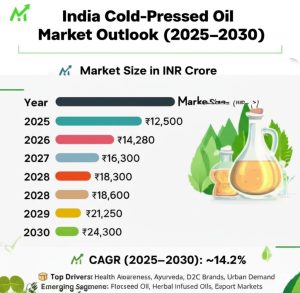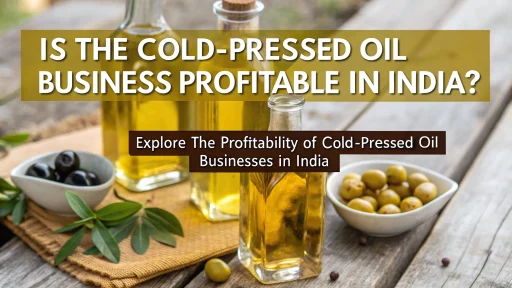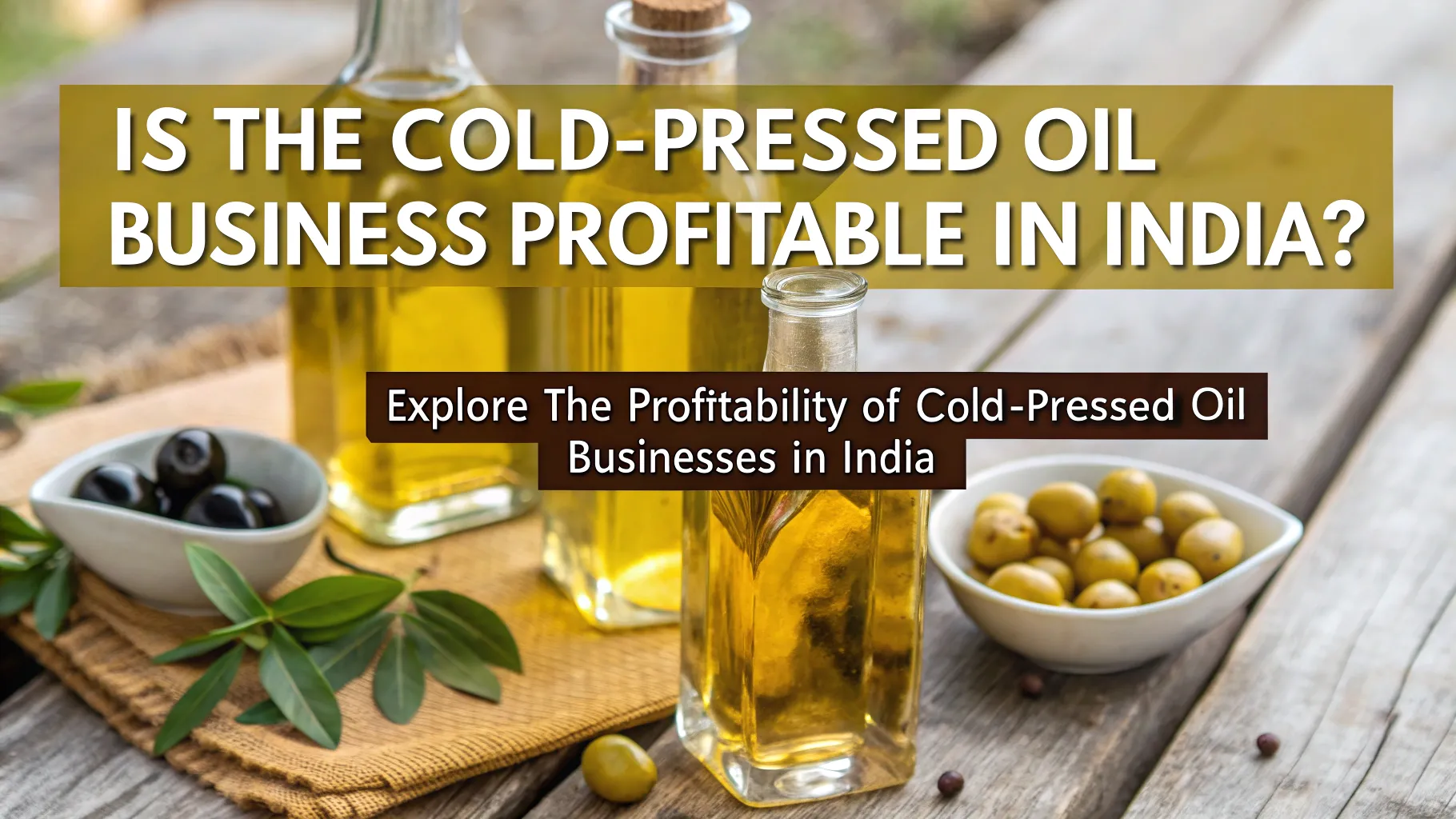India’s historical association with natural foods, traditional culinary practices, and Ayurvedic health principles positions cold-pressed oils as a resurgence of authentic health practices, rather than just a passing trend. As health-conscious consumers move away from refined and heavily processed oils, cold-pressed oils are gaining traction due to their superior nutritional value, health benefits, and chemical-free processing.
This trend fosters a novel Indian entrepreneurial model, blending traditional methods with modern consumer demands. Cold-pressed oil production presents a potentially profitable and scalable opportunity for startups, characterized by steady demand, minimal environmental impact, and strong brand potential rooted in core values.
The Concept of Cold-Pressed Oils
Cold-pressed oils are mechanically extracted, maintaining a low temperature of 50 degrees Celsius. Unlike refined oils, which undergo chemical treatments and high temperatures, cold-pressed methods preserve essential nutrients, antioxidants, vitamins, and beneficial fatty acids.
The result is a whole, unrefined, aromatic oil derived from traditional wooden Ghanis or modern stainless steel expellers that operate without heat or solvents. This oil serves multiple purposes, including cooking, skincare, Ayurvedic practices, and general wellness.
The increasing demand for unrefined oils, free from hexane solvents and chemical bleaching agents, coupled with a natural and traceable source, positions them as a viable replacement for refined oils. This trend is a significant boost for cold-pressed oil manufacturing businesses.
Related: Red Onion Oil Business: How to Launch a Profitable Brand
What Makes Cold-Pressed Oil a Profitable Business in India?
Several factors contribute to the profitability of the cold-pressed oil sector. There is growing demand for cold-pressed oils among businesses in urban areas, fitness centers, and Ayurvedic practitioners. India’s ample production of groundnut, sesame, and mustard seeds provides a readily available source of raw materials for manufacturers.
Effective sourcing and local production units facilitate healthy profit margins, while a brand narrative centered on sustainability, traceability, and wellness enhances the appeal of organic, non-GMO, and artisanal products both domestically and internationally. Cold-pressed oil ventures can generate consistent revenue through retail packaging, export contracts, private label manufacturing, and institutional supply, provided they maintain proper branding, compliance, and distribution channels.
India’s Cold-Pressed Oil Market Outlook (2025-2030)
The Indian cold-pressed oil market is experiencing steady expansion, with continued growth anticipated over the next five years. Fueled by increasing awareness of food safety, lifestyle changes, and the expansion of e-commerce, the market is transitioning from a niche segment into a mainstream wellness industry.
Market analysis projects the market to reach ₹12,500 crore by 2025, with an estimated CAGR of over 14%. While groundnut, mustard, sesame, and coconut oil currently dominate the market, newer entrants like flaxseed and avocado oil are gaining popularity among health-conscious consumers.
Growth extends beyond major metropolitan areas, with increasing demand in Tier 2 and 3 cities driven by digital platforms, influencer marketing, and fitness communities. Furthermore, the increasing use of cold-pressed oils in Ayurveda and personal care products creates additional revenue opportunities for entrepreneurs.

Step-by-Step Manufacturing Process of Cold-Pressed Oil
While cold-pressed oil production may appear traditional, incorporating scientific and hygienic practices is essential for scaling production. A thorough understanding of each manufacturing stage is crucial for maintaining quality and operational efficiency.
- Procurement: The process starts with sourcing clean, high-quality seeds, such as groundnut, sesame, or mustard, from agricultural markets or directly from registered farmers.
- Cleaning: Upon arrival at the processing facility, the seeds undergo thorough cleaning using air blowers, sieves, and de-stoners to remove dust, husk, and other foreign particles.
- Drying: After cleaning, the seeds are dried in sunlight or using mechanical dryers to reduce moisture levels to below 10%. Maintaining appropriate humidity levels is crucial to prevent fungus, lower oil yield, and reduce shelf life.
- Pressing: The dried seeds are fed into a cold-press machine, either a traditional wooden Ghani or a modern screw-based expeller, which maintains low temperatures throughout the extraction. The mechanical pressing ruptures the seed walls, releasing the oil without external heat, thus preserving its color, aroma, and natural antioxidants.
- Filtering: After pressing, the oil is either allowed to settle naturally in tanks or filtered through cloth to remove residue and solid particles, ensuring clarity and stability. Some manufacturers opt for double filtration to further enhance clarity.
- Packaging: The filtered oil is then packaged and labeled in glass or PET food-grade containers. These containers protect the oil from light, provide tamper evidence, and extend its shelf life.
- Residue Utilization: The residual material is collected and repurposed as organic feed, biofertilizer, or cattle feed, maximizing the value of raw materials.
Related: How to Start a Manufacturing Business of Edible Oils Processing
Incorporating Oils into Products and Services
While refined edible oil remains the primary oil used, cold-pressed oil is making inroads into the beauty and wellness industries, including cosmetics and personal care products. Coconut, almond, and sesame oils are commonly found in hair and baby oils, while mustard oil is valued for its antibacterial properties and use in traditional massages. Restaurants, organic cafes, and food startups are increasingly adopting cold-pressed oils to promote themselves as healthier brands.
Additionally, Ayurvedic medicine manufacturers are using cold-pressed oils as a base for their herbal infusions. The projected growth of India’s wellness and organic sectors to exceed $20 billion in the next five years indicates a substantial demand for these products. Obtaining certifications like FSSAI, USDA Organic, and ISO 22000 can unlock significant market opportunities.
View our Book on Oils and fats
Setting Up a Startup Using Cold-Pressed Oils
Startups in this sector face challenges, including a lack of consumer understanding regarding the differences between refined and cold-pressed oils. Effective storytelling and transparency in marketing are essential for educating consumers. Another challenge is the lower oil yield of cold pressing compared to solvent extraction, averaging 5-10% less. This can affect profitability if cost management isn’t in place.
However, the higher market price of cold-pressed oils, sometimes double that of refined oils, can offset this drawback. The shorter shelf life of cold-pressed oils, typically 3 to 6 months, can be addressed through specialized airtight packaging, batch-level quality control, stricter quality inspections, and reduced inventory cycles. Adhering to hygiene standards and acquiring necessary area licenses are also crucial steps for building business trust.
The Export Potential of Cold-Pressed Oil: Unlocking Global Opportunities
Oilseeds have strong international demand. Sesame oil, for example, is highly sought after in Japan, South Korea, and the Middle East. Cold-pressed groundnut and coconut oils also have established markets in the US, Canada, and Europe, particularly among vegan and clean-label consumers.
India’s existing network of natural food product exporters provides a channel for entrepreneurs to establish B2B partnerships with international importers, Ayurveda companies, and gourmet retail chains by offering certified cold-pressed oils. Trade fairs, export expos, and government initiatives like APEDA further enhance this potential.
For more information check out this related video here
How NPCS Supports Cold-Pressed Oil Startups
Niir Project Consultancy Services (NPCS) offers industry-specific support to entrepreneurs entering the cold-pressed oil sector. Their comprehensive Market Survey cum Techno Economic Feasibility Reports help assess the viability of new ventures by covering:
- End-to-end manufacturing process and quality standards
- Raw material sourcing, utility requirements, and plant layout planning
- In-depth market research, competitive analysis, and financial projections
With NPCS, startups gain expert insights and implementation roadmaps that reduce risk and increase execution efficiency in industrial setups.
Find Best Idea for Yourself With our Startup Selector Tool
Conclusion: An Ideal Blend of Tradition, Innovation, and Impact
The cold-pressed oil business in India is more than just a profitable venture — it’s a convergence of culture, science, health, and entrepreneurship. It allows businesses to champion sustainability, empower rural economies, and respond to a rapidly evolving consumer landscape.
For industrial entrepreneurs and manufacturing startups, it offers a clear value proposition: strong market demand, low ecological footprint, diverse product verticals, and meaningful impact. With thoughtful planning, strategic partnerships, and expert guidance, cold-pressed oil manufacturing can evolve into a highly rewarding and future-ready business.






